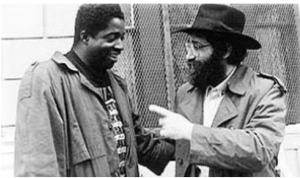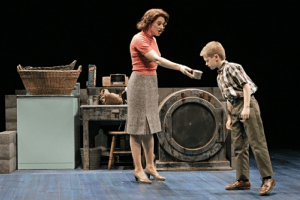Renee Reiner
Caroline, or Change is a 2003 musical that focuses on the life of the Gellman family and their maid, Caroline. The Gellman’s, particularly Rose and Noah, interact with Caroline throughout the musical; their relationships with one another form throughout the musical. It is interesting to focus on these interactions, as the Gellman’s come from a Jewish, white background while Caroline is a black Christian. As the plot progresses in Caroline, or Change, it can be seen that the Gellman’s, particularly their Jewish tradition, influences Caroline. Also, Caroline’s background influences the Gellman’s. So, Judaism and Jewish tradition can influence people from other backgrounds and be influenced by those backgrounds to hopefully become accepted.
Judaism is known to influence those from other backgrounds. Due to the three sects within Judaism, Orthodox, Conservative, and Reform, people from various backgrounds can find something to relate to. “Jews today can choose from a spectrum of religious ways of Jewish living from ultra-orthodoxy to creative innovation to atheistic Jewish religion. American Jews can find secular ways of expressing their identity, cultural forms of Jewish living, and purely individual and idiosyncratic forms of being Jewish” (Hartman 2006). Jewish identity can be expressed in various forms, causing the religion to be more relatable. For example, people choose to convert to Judaism and influence their religious identity with their ethnic identity. “…different ethnic identities [have] becom[e] co-joined with Judaism, somewhat similar to Italian Catholics, and Irish Catholics… The many possibilities for ethnic/religious fusion or separation or recombination have grown as Jews have been accepted more fully into “diaspora” countries and nation states…” (Hartman 2006). Judaism has become more recognized now that it has spread to other countries, allowing non-Jews to be influenced by its culture and tradition.
Daniel Itzkovitz, an author who explores the relationships between Jews and African Americans, looks closely at how Jews can influence those from other religions. He sees Jews, “…to be the ‘type O negative’ of ethno-racial groups, able to enter the bloodstream of any group and exist there in culturally meaningful ways” (Itzkovitz 2005). Judaism is filled with unique character and history, and many aspects of it seem familiar, allowing those from other groups, such as African Americans, to relate to it (Itzkovitz 2005). Judaism’s culture, which consists of family, food, and tradition, can easily influence others and mesh with different people and cultures.
One main aspect of Judaism and Jewish tradition that has impacted those from other cultures is the food. Jews take pride in their various Jewish dishes such as matzo ball soup, brisket, and stuffed cabbage. The Gellman’s are constantly cooking and eating this type of food, so Caroline has been directly exposed to it. Caroline’s exposure is noticed in the Chanukah scene, where Caroline and two other women are prepping the Chanukah meal. As they are cooking latkes Caroline says, “If you don’t fry em right away they start turning gray” (83). Working for the Gellman’s allowed Caroline to understand Jewish customs because she learned how to cook latkes, a staple Jewish food. So, even though Caroline is not making latkes on her own at home with her children, she is still impacted by Jewish tradition and food because she is able to make latkes for the Gellman’s.
Jews have also always wanted to be seen in a positive light and accepted by those from other backgrounds; this notion can be traced back to the nineteenth century south. When Jews from the south spoke with southerners from other backgrounds, ““They claimed to be descended from the noble and aristocratic Jews of Spain and Portugal, the Sephardim, when in fact very few actually were. This status, they hoped, would allow them to gain acceptance among their non-Jewish peers as ‘southern gentlemen’” (Peck 1987). Jews hoped to gain respect from their non-Jewish neighbors, and felt like the way to do so was to speak about their background. Throughout Caroline, or Change, Rose wants Caroline to accept her and see her as a friend. To start this friendship, Rose thought it would be best to try to help Caroline with her finances by offering her money. “So I guess Mr. Gellman has to learn the rule: he loses any change he leaves and you can keep it, just like Noah’s, you can keep it…”(75). Rose thinks that she is doing Caroline a favor when in reality, this upsets Caroline. “I don’t want it! I ain’t some ragpick. Ain’t some jackdaw” (75). Caroline works for Rose and is considered below Rose because she is Caroline’s boss, yet Rose wants Caroline to accept her, just like the Jews of Spain wanted to be accepted by their non-Jewish peers.
Rose continues to want Caroline to accept her. The director decides to portray Rose as someone who acts like a Jewish mother, a typical Jewish stereotype. Jewish mothers are characterized, “…as vulgar, overbearing, and grotesque, and all too close at hand…In countless greeting cards she appears as a bulk matron…shrill and demanding, proffering not love but greed, not a nourishing plenitude, but oral suffocation (“eat! eat!”) (Zemel 2015). Although Rose does not demonstrate all of these characteristics, she is constantly overbearing when talking with Caroline and constantly demands that Caroline bring home food. “Caroline, there’s extra food: Sweet stuffed cabbage, cooked with brisket. It’s nutritious! Iron! Vegetables! Bring it to your kids” (19). Caroline responds saying, “I can’t use none, Mrs. Gellman, my kinds don’t like it, turn they noses up. The smell…” (19). Rose answers again, “Tell them cabbage is good for them! Make them eat what’s good for them! They’ll get used to the smell…Cabbage boiled, iron beets, it makes them strong, children should be strong, and BIG!” (20). Although Caroline does not start to act like a Jewish mother, she is exposed to Judaism and the classic Jewish mother stereotype by interacting with Rose who insists on Caroline bringing home food. Rose also uses Yiddish words when describing Caroline and her state, indirectly influencing her by showing how Judaism and Caroline do work together. “The Negro maid, she’s making bupkes, how does that look, leaving change in his pockets?” (26). The word bupkes is Yiddish, and figuratively it means having nothing. Instead of telling her father that Caroline makes nothing, she uses the Yiddish word for nothing, weaving Judaism into her thoughts on Caroline’s financial status.
It is clear that the Gellman family has influenced Caroline-they have introduced her to Jewish cooking and have showed her what it means to be a Jewish mother. Although the Gellman family has impacted Caroline, she has agency within the text and is able to influence them as well. Noah is particularly impacted by her. He constantly speaks highly of her, saying, “Caroline is king and Caroline is queen and Caroline is stronger than my dad; it isn’t true, she doesn’t hate it, she’s a lot stronger, stronger than you” (37). In Noah’s mind, Caroline is greater than everyone, even his own dad. His admiration for Caroline becomes more apparent when he purposefully leaves coins in his pocket so that Caroline can talk about him at home with her own family. “That night I leave a dime and nickel in my pants pocket to see what will happen; Caroline finds them” (53). Noah goes out of his way to leave change in his pocket; he is desperate to be talked about in Caroline’s home. Caroline’s ability to impact Noah stems from her personality. She is strong-willed and works hard and Noah is able to sense that. Caroline is also able to influence Noah due to how similar it is to be black and to be Jewish; they are both minority groups with similar social and community contexts. It can be argued that, “…blackness-and especially an appropriation of a black-identified language-becomes a way to be ‘more Jewish’ by providing a New World context for social critique, community, and an understanding of suffering and the ‘human condition’ both social and metaphysical” (Boyarin). Blacks can understand the pain Jews have gone through and can relate to them since they both have a minority status. Although Noah does not explicitly states that Caroline is a relatable character due to the color of her skin, he feels comfortable around her and inspired by her.
Caroline, or Change is more than just a musical about a maid and the family she works for. It is filled with Jewish influences, Black influences, and the relationship between these two minority groups.
Sources:
Hartman, H., & Kaufman, D. (2006). Decentering the study of jewish identity: opening the dialogue with other religious groups. Sociology of Religion, 67(4), 365-385.
Zemel, C. (2015). Difference in diaspora: the yiddishe mama, the jewish mother, the jewish princess, and their men. Looking Jewish (104-136). Indiana University Press.
Peck, A. J. (1987). The other “peculiar institution”: jews and judaism in the nineteenth century south. Modern Judaism, 7(1), 99-114.
Itzkovitz, D. (2005). Race and jews in america: an introduction. Shofar: An Interdisciplinary Journal of Jewish Studies, 23(4), 1-8.
Boyarin, J. & Boyarin, D. (1997). Jews and Other Differences. Minneapolis, MN: University of Minnesota Press.




